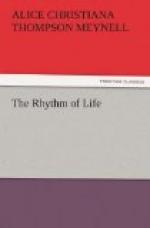Evidently we cannot choose our posterity. Reversing the steps of time, we may, indeed, choose backwards. We may give our thoughts noble forefathers. Well begotten, well born our fancies must be; they shall be also well derived. We have a voice in decreeing our inheritance, and not our inheritance only, but our heredity. Our minds may trace upwards and follow their ways to the best well-heads of the arts. The very habit of our thoughts may be persuaded one way unawares by their antenatal history. Their companions must be lovely, but need be no lovelier than their ancestors; and being so fathered and so husbanded, our thoughts may be intrusted to keep the counsels of literature.
Such is our confidence in a descent we know. But, of a sequel which of us is sure? Which of us is secured against the dangers of subsequent depreciation? And, moreover, which of us shall trace the contemporary tendencies, the one towards honour, the other towards dishonour? Or who shall discover why derivation becomes degeneration, and where and when and how the bastardy befalls? The decivilised have every grace as the antecedent of their vulgarities, every distinction as the precedent of their mediocrities. No ballad-concert song, feign it sigh, frolic, or laugh, but has the excuse that the feint was suggested, was made easy, by some living sweetness once. Nor are the decivilised to blame as having in their own persons possessed civilisation and marred it. They did not possess it; they were born into some tendency to derogation, into an inclination for things mentally inexpensive. And the tendency can hardly do other than continue. Nothing can look duller than the future of this second-hand and multiplying world. Men need not be common merely because they are many; but the infection of commonness once begun in the many, what dulness in their future! To the eye that has reluctantly discovered this truth—that the vulgarised are not uncivilised, and that there is no growth for them—it does not look like a future at all. More ballad-concerts, more quaint English, more robustious barytone songs, more piecemeal pictures, more anxious decoration, more colonial poetry, more young nations with withered traditions. Yet it is before this prospect that the provincial overseas lifts up his voice in a boast or a promise common enough among the incapable young, but pardonable only in senility. He promises the world a literature, an art, that shall be new because his forest is untracked and his town just built. But what the newness is to be he cannot tell. Certain words were dreadful once in the mouth of desperate old age. Dreadful and pitiable as the threat of an impotent king, what shall we name them when they are the promise of an impotent people? ‘I will do such things: what they are yet I know not.’




